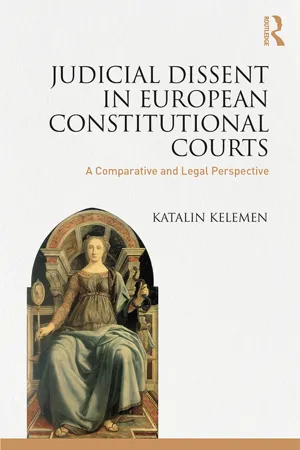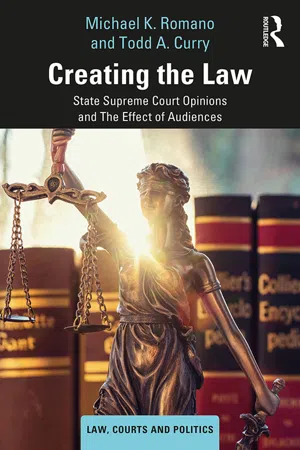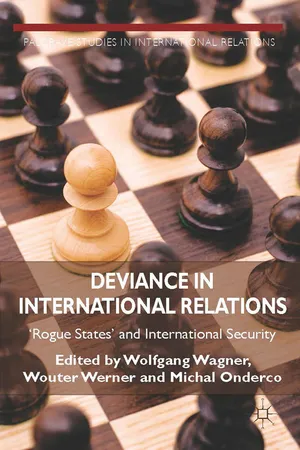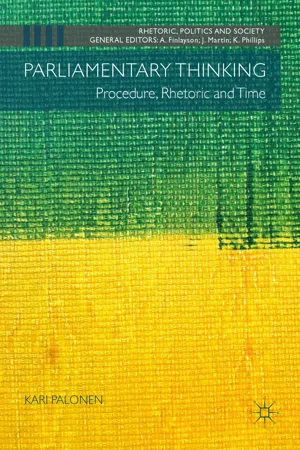Politics & International Relations
Dissenting Opinion
A dissenting opinion refers to a disagreement expressed by one or more judges in a legal case who do not fully support the majority decision. This dissenting view provides an alternative perspective and rationale for the decision, often highlighting differing interpretations of the law or the case's facts. In the realm of politics and international relations, dissenting opinions can influence future legal interpretations and public discourse.
Written by Perlego with AI-assistance
Related key terms
Related key terms
1 of 4
Related key terms
1 of 3
4 Key excerpts on "Dissenting Opinion"
- eBook - ePub
Judicial Dissent in European Constitutional Courts
A Comparative and Legal Perspective
- Katalin Kelemen(Author)
- 2017(Publication Date)
- Routledge(Publisher)
Judicial dissent What is it and why does it matter?1. Judicial dissent and Dissenting Opinions: a definition
By ‘Dissenting Opinion’ we mean a separate opinion that diverges from the opinion of the majority of a group. Naturally, dissent can only exist if the decision is taken by multiple actors. It means that in a court it can exist only if there is a collegial body that decides the case. In other words, dissent can occur in a judicial panel. It cannot occur if the judgment is delivered by a single judge. In this book, the expressions ‘judicial dissent’ and ‘Dissenting Opinion’ will be used as synonyms. The former refers to the phenomenon of judges writing separately, while the latter points to its product. It is also important to clarify that the expression ‘Dissenting Opinion’ can be used in a broad or a strict sense. In the broad sense a Dissenting Opinion is any separate opinion of a member of a judicial panel. A dissenter, however, may disagree with the majority only in part. He may ‘concur’ in the outcome of the case but indicate different reasons for reaching such conclusion. In this case her/his separate opinion is called, more technically, ‘concurring opinion’. A Dissenting Opinion in the strict sense, on the other hand, disagrees with the majority also as regards the ruling. A dissenting judge would have decided the case differently. Conversely, a concurring judge would have simply written the judgment differently, without changing the outcome of the case. Thus, a concurring opinion generally offers an alternative reasoning to the decision, but it may also simply add further arguments (supplementary reasoning) or aim to explain better the opinion of the court (explanatory opinion).1 - eBook - ePub
Creating the Law
State Supreme Court Opinions and The Effect of Audiences
- Michael K. Romano, Todd A. Curry(Authors)
- 2019(Publication Date)
- Routledge(Publisher)
At the heart of our analysis is an attempt to understand the foundational cognitive processes that culminate in the written opinion. To understand these processes, we must examine how judges use language in order to influence colleagues to agree with their policy stances. We posit that the inclusion of a dissent has a distinct impact on the power of an opinion to act as a rhetorical tool. In order to understand exactly what this does to the majority opinion, we take these developments in two parts, which emphasize both the dueling nature and also collaborative requirements inherent in justification and persuasion. While the audience of a judicial opinion is generally external to the court (Baum 2006), colleagues are the most immediate audience to the decision and have the most direct ability to influence its language. The other judges on the panel are exceedingly important to the majority opinion author since they are “a means to advance [a judge’s] goals of achieving good legal policy” (Baum 2006, 22). Language is key to understanding how this interplay in translated into social policy by giving us insight into the individual thought processes of actors involved in its development (Owens and Wedeking 2012; Tausczik and Pennebaker 2010).When to Dissent?
To start, we first focus on what factors lead to the issuance of a Dissenting Opinion. Analyzing the effects of linguistic choices on the presence of a dissent, we focus specifically on the trade-off between analytic language and authenticity. We believe that dissents are issued when the majority focuses primarily on persuasion over justification, which we believe is indicative that the decision is tenuous amongst members of the bench. The tactic of persuasion implicitly acknowledges that there exist a multitude of ways to resolve the conflict, whereas justification begins from the logical standpoint that the outcome is preordained by the facts surrounding the case and the applicable law.In order to test this assumption, the first part of our analysis focuses on a multilevel logistic regression predicting the occurrence of a dissent. As we found in Chapter 3 - eBook - ePub
Deviance in International Relations
'Rogue States' and International Security
- W. Wagner, W. Werner, M. Onderco, W. Wagner, W. Werner, M. Onderco, W. Wagner, W. Werner, M. Onderco(Authors)
- 2014(Publication Date)
- Palgrave Macmillan(Publisher)
In order to open up possible avenues for the study of dissident foreign policy, we will subsequently flesh out some conceptual aspects of dissidence and discuss the prevailing obstacles for its study in International Relations and Foreign Policy Analysis. We will then further detail the current challenges of coming to terms with dissidence on a theoretical level and propose one possible approach. As a first attempt to highlight the empirical viability of studying dissident foreign policy, we will then outline three ideal-typical manifestations of dissident foreign policy practice. The conclusion will sum up the argument and some of its implications for the study of world politics.Dissidence as a change of perspective
In International Relations (IR), the term ‘dissidence’ holds a particular place in the poststructuralist tradition where it is used with a positive connotation to describe cherished scholarly practices that deviate from those of an alleged mainstream and mark a willingness to ‘speak the language of exile’ (Ashley and Walker 1990, Hamati-Ataya 2011). To the extent that it relates to phenomena of global politics, it refers mostly to non-state practices, for example the ‘transversal dissident practices’ of broader social movements as ‘forms of thought and action that not only transgress, but also challenge the political order which has developed around the assertion of national sovereignty’ (Bleiker 2004: 9). Poststructuralist authors tend to sympathize with these movements, as they themselves criticize mainstream IR for conceptualizing international politics as the business of nation states. State actions, in turn, are not associated with dissidence but its opposite – repression. From this perspective, government-run foreign policies maintain the existing international order and treat dissident practices ‘largely in repressive terms’ (Bleiker 2004: 3). The celebration of dissidence as the ‘politicizing work of thought’ (Ashley and Walker 1990: 263) and transversal practice from below represents one of two characteristic ways in which the discipline deals with deviant political practices. The other option is to follow political rhetoric by investigating how ‘rogue states’ or ‘outlaw nations’ can be successfully managed or effectively deterred (for example, Dueck 2006, Henriksen 2001). These two ways of scholarly engagement are indicative of a broader pattern in treating radical forms of political resistance – they are either romanticized or vilified. - eBook - ePub
Parliamentary Thinking
Procedure, Rhetoric and Time
- Kari Palonen(Author)
- 2018(Publication Date)
- Palgrave Macmillan(Publisher)
motion in order to provide necessary conditions for judging its strengths and weaknesses.Parliamentary procedure relies on the expectation that the resolution of a motion , the justifications for it or both can always be contested. Every motion on the parliamentary agenda must be justified by the initiator, whether an individual member, a government minister or adopted from a citizen petition. If no alternative perspective is readily available, the members must be given occasions to think out such perspectives , to make thought experiments by altering the perspective and reconsidering the strengths and weaknesses of the motion in the light of them.Without comparison with dissenting perspectives, the political significance of a motion on the agenda cannot be properly evaluated. The dissensus between perspectives is connected to what I have called (Palonen 2010 , 2017 ) ‘a parliamentary theory of knowledge’: without opposite perspectives on the question, the question itself cannot be understood.The Canadian rhetoric professor James De Mille formulates the principle of dissensus as follows: ‘The aim of parliamentary debate is to investigate the subject from many points of view which are presented from two contrary sides. In no other way can a subject be so exhaustively considered’ (De Mille 1878 , 473). George Jacob Holyoake, a British nineteenth-century activist and rhetorical analyst, formulated the same point as follows: ‘Discussion is excellent discipline in the art of discovering what a point is and what relates to it. Discussion is always valuable, inasmuch as it elicits contrariety of opinion that nobody could suspect, and misconceptions which nobody could imagine. No person can be said to entirely understand any subject until he has debated it with sharp-witted people’ (Holyoake 1897
Index pages curate the most relevant extracts from our library of academic textbooks. They’ve been created using an in-house natural language model (NLM), each adding context and meaning to key research topics.
Explore more topic indexes
Explore more topic indexes
1 of 6
Explore more topic indexes
1 of 4



